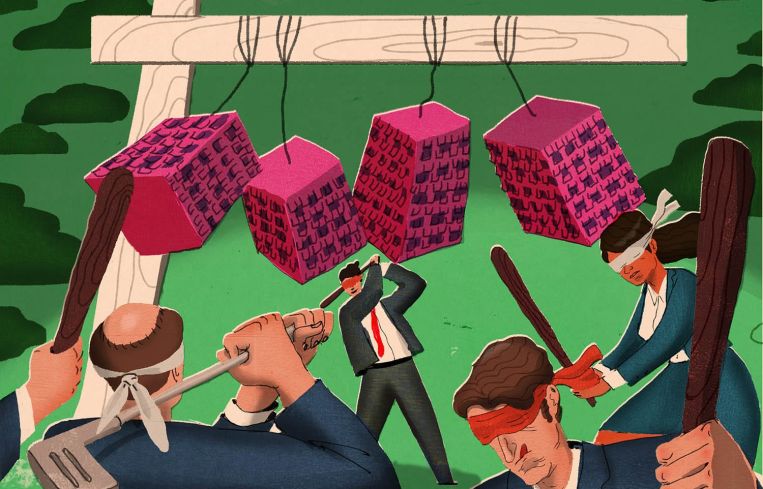Site Unseen: Grappling With Due Diligence Amid COVID-19
"Even if you have to wear a hazmat suit, you walk the property"
By Mack Burke November 3, 2020 11:54 am
reprints
Verde Capital President Jake Reiter recently took part in a parade.
Except, there was no ticker tape or gobs of candy being thrown to pedestrians, no decorated ferries or loud music; only cars, some iPads and a conference line.
Reiter, a 35-year commercial real estate veteran, was touring an urban multifamily project, a potential investment for his firm.
The “parade” consisted of five cars, the members of each deal party in their respective vehicles. Each person had an iPad with all of the property-level and market-related details, and everyone was connected by phone via a conference line. It was “like a virtual tour,” Reiter said.
“I set it up — a ‘planes, trains, and automobiles’ [kind of thing],” Reiter quipped. “We went to the site in our cars, and we all had masks and stood 10 feet apart. Then, we were in a parade and drove through downtown looking at all the [comparables]. We had the developer and the debt guys [with us], and spent four or five hours [doing this] after we had done desktop analytics and talked to appraisers and cost engineers and that type of thing.”
When it concluded, the members of each deal party then “all waved goodbye and went in various directions,” Reiter said. “That’s been the story now.”
The story Reiter refers to is one of adaptation. Real estate investors, developers and financiers have been forced into utilizing various techniques to do their due diligence and properly underwrite assets in order to eliminate as many uncertainties as possible before they close a deal. Reiter’s parade through a relatively empty urban center is one example of the new normal to which the marketplace has been forced to swiftly adapt.
But, despite a rush to push forward with innovative methodologies, today’s commercial real estate deals are littered with blind spots as a result of working within an unfamiliar, pandemic-stricken landscape. The obvious health concerns and risks to each person in a deal elongate transaction timelines to a frustrating degree. Piled on top of that is additional administrative work, complex scheduling and exhaustive, yet — some say — relatively flimsy underwriting, driven by uncertainty in the market.
Performing due diligence today is, of course, even more critical than eight months ago, and something that must be completed despite the potential health risks involved in site visits. As such, sources told Commercial Observer that real estate players — for the most part — are ensuring this is done thoroughly, regardless of the timeline.
Chief among the many transactional concerns, though, is the underwriting dilemma. So sensitive is the task that many lenders and investors will take a punt on a transaction at the slightest whiff that it won’t pencil out. After all, why go through the tediously intensive, wall-to-wall review process if you have even the slightest bit of doubt?
“If a lender wants to do a deal, they can get a deal done; it hasn’t been easy but it’s not impossible,” said Jerome Sanzo, head of real estate finance for the Industrial and Commercial Bank of China. “The bigger challenge is, how do you underwrite cash flows and how do you get valuation comparables? How recent is it, how reliable is it, and how do you underwrite those cash flows? It’s easy to do [a deal] leased to Amazon, Google or the U.S. government. It’s difficult to underwrite rents and lease terms in a downtime. How long is it between lease [expirations]? What [tenant improvement allowances] will be required?”
Sanzo recently spoke to an apartment owner about a building and was told that the owner had to slow down leasing at the property because the firm wanted to be more careful about what tenants it would accept, due to the fact that “[they] can’t evict if they don’t pay.” Sanzo said the property was completed about a year ago and is more than 90 percent leased but that the owner isn’t sure they’ll allow it to get higher.
This is one small example of how COVID-19 challenges could impact underwriting.
“Nobody really focused on [occupancy and rent collection] before,” Sanzo said. “Now, you can have it all rented out, but are tenants actually paying?”
Tony Marquez, senior executive vice president of commercial banking at EagleBank, said deals have to make sense from the start, especially when it comes to the leverage point and the sponsor. That’s especially important amid the pandemic, he added, though not much has changed for his own bank since COVID-19 hit, aside from it adopting a heightened level of “caution and skepticism,” he said.
“Anytime there’s uncertainty, it gets harder to do anything or even get a purchase and sale agreement signed,” Marquez said. “Capital abhors any kind of uncertainty, so that has an impact on everybody’s behavior.
“There’s an extra risk layered into all transactions,” he added. “Where it goes, nobody knows, because this is new to all of us. It’s new territory, and everyone’s feeling their way through it.”
With that, site inspections have become their own beast — as per Reiter’s investment experiences — headlined by traveling risks, quarantining, and pandemic-related social distancing measures that imapct people’s ability to be present.
Sanzo, who routinely toured sites pre-pandemic, hasn’t been on a plane since February, and he’s not alone. Lenders, normally racking up air miles as though they’re part of a flight crew, have mostly been grounded at home.
Marquez’s recent tour of a data center in the D.C-Maryland-Virginia area took much longer than it otherwise would have and was complete with temperature checks and the like.
Square Mile Capital Management senior director Jeff Fastov said recently on a CO event panel that his first flight in some seven months was when he flew to Boston to see the aster-planned Cambridge Crossing mixed-use residential and office project in nearby East Cambridge. Earlier this year, Square Mile lent its developer, DivcoWest, $434 million for the next phase of the development. Overall, the project will sport millions in office square footage for tech and life sciences tenants.
Reiter said the process of getting to a site varies for each deal party, the traveling guidelines and general wariness differing company to company and person to person. Still, for new and existing deals, being able to gauge the performance and outlook of different prospective markets that have been hit by COVID-19 is paramount.
“It’s more of a challenge now,” Sanzo said. “Most lenders and most regulated bank lenders will have a policy that somebody has to see a property before you make a loan, and most portfolio lenders will have a policy that you should see every property at least once a year.”
The reasoning is quite obvious, Sanzo said, and even more pronounced in today’s climate.
“You want to make sure that before you make the loan or while you have [it on your books], there’s no deferred physical maintenance or capital expenditures that will be needed that weren’t planned for, and that property management is keeping the property up to the quality you originally underwrote,” he said.
“The issue is that some, but not all, big lenders — banks and insurance companies — have policies that are discouraging employee business travel,” Sanzo added, saying that, while it’s necessary but quite inconvenient, there are workarounds.
Verde Capital is currently looking at buying a multifamily property in Charlotte, N.C. — one of a handful of prime secondary cities that have gained steam against major MSAs (metropolitan statistical areas) this year — and “some [people involved in the deal] will fly to Charlotte, some will not,” Reiter said. “Some are comfortable flying and renting cars, and some who are not comfortable will drive to Charlotte. But there’s flexibility built into people’s differing comfort levels.”
Once everyone involved in a deal finds their way to a market and a site, it becomes even trickier when weighing comparables, Reiter said.
“They are leased, so we don’t want to go into the building, obviously,” he said. “And appraisers, under COVID-adapted rules, can enter the building and get pictures and comp it that way. You touch all the assets as best you can [that way] and you drive the market. Maybe you look at common areas, maybe you don’t, rather than looking at extensive interior photos. Lenders are doing the same thing.”
Sanzo said the common workaround for lenders might be to find a third party to do the due diligence. These can include subcontractors, appraisers, consultancies or due diligence firms.
“There are shops out there that will do this for lenders; they may have people out in the field,” Sanzo said. “There are companies that do environmental and property assessments that might have offices across the country in order to do site visits for lenders.” CMBS originators commonly use third-party firms.
Will delays in site inspections stop ICBC deals? “No, we can get it done,” Sanzo said, but he added that his group has, indeed, gotten calls from hungry “consulting firms saying, ‘We can do it for you.’”
“Third parties aren’t going to win or lose a deal for you,” Sanzo said. “Everybody’s putting the same pressure on appraisers, and the timeframe for getting an appraisal done is stitched out as well as a property conditions report; unless we have another lockdown, where they just can’t go to a site. And then, another challenge is the legal documentation, if you have to have a hard copy wet-signed. A notary had to come to me the other day. Normally, I’ve got someone in the office who’s a notary. People are working around [the hurdles].”
Given the lengths to which lenders will go to not get caught out with a bad deal in this market, most aren’t letting borrowers get away with a lazily done due diligence exercise or a virtual-only tour of a property. (Demand has actually been growing for [property technology] startups that provide products that facilitate virtual tours, with venture capital firms like Camber Creek pouring money into the space, The Wall Street Journal reported in late October.)
Despite the complexities, risks and availability of virtual-only touring technology, “I want someone with dirt under their fingernails,” the head of a real estate finance division of a large foreign bank lender told CO anonymously in order to avoid any internal conflicts.
“On a new loan, it’s 100 percent important you walk the project,” the foreign bank lender added, saying that their bank follows all of the necessary COVID-19 protocols when it walks properties. “You have to touch it and feel it. You can only do so much with plans and specs and photos. It’s a very sensory type of product you’re involved in. [When it comes to investing], even if you have to wear a hazmat suit, you walk the property.”
The foreign bank lender hinted at the need for institutional lenders to prioritize experienced sponsors — and mostly existing clients — who they can trust to do the right thing, and who are eager to see and understand an asset, which aligns with today’s narrative that banks have mostly stuck to their existing clients who they know can deliver.
“The standards are high as it relates to signage, distancing, sanitization, filtration and [things like a] max number of people in an elevator,” the foreign bank lender said. “We talk to the borrowers and ask them what they’re doing; we communicate regularly with them. It’s a high-touch environment. We know them well, and we understand their standard of care.”
Transactional risks never go away, no matter how diligent a lender or sponsor may be — but who’s really in a hurry to close today?
“We’re deferring our pipeline and [are not really looking] for new business,” Sanzo said, adding that it’s very difficult to onboard a new client today. “There are banks making loans in some areas, haircutting yesterday’s rents. There’s no formula, so I think structures will get tighter and tighter and tighter. I see more non-bank lenders making loans. We have gotten really cautious, because I’m having difficulty assessing how to underwrite and project cash flows unless it’s a clear answer.”
Ultimately, the additional challenges in inspecting, undergoing due diligence and closing are hairy, but signs point to the commercial real estate industry embracing this much more collaborative effort.
The sector will continue to sit in its defensive posture — staring down ongoing COVID-19 containment efforts in response to an increase in virus cases and the fact that even more risk is likely to enter the market in the next several months — while it awaits a vaccine and another round of government stimulus to bring some more clarity and security to the market.
“We’ll have this uncertainty for a while,” Sanzo said. “Every month, I’m thinking, ‘We can wait another three months.’ We thought we might be getting closer, but now we’re hearing more and more about spikes in the U.S.”


